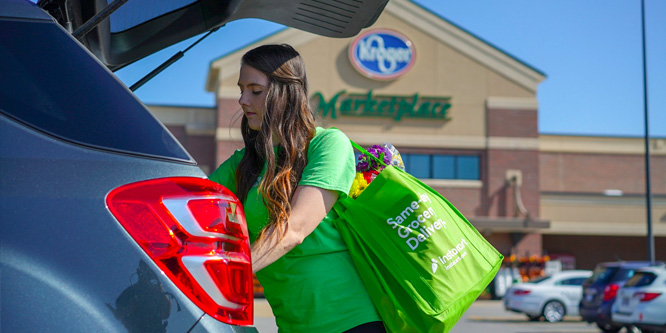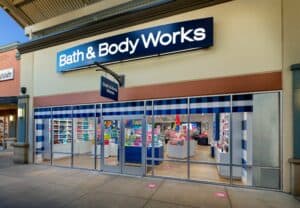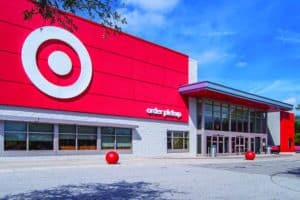
Photo: Kroger
December 12, 2018
Is Kroger following the Sears playbook for self-destruction?
Last week, Kroger reported its third quarter earnings, and one industry expert has questioned whether the grocery giant is on the right path or if it is making the same types of mistakes that caused Sears to crash and burn under former CEO Eddie Lampert.
Specifically, Neil Saunders, managing director of GlobalData and a member of the RetailWire BrainTrust, expressed concern that Kroger may be focusing too much attention on growing digital sales at the expense of its physical locations, MarketWatch reports. He pointed to Kroger stores that “feel run down and dispiriting” as a cause for concern.
“This [digital] mantra was also one peddled by Eddie Lampert, who used it to justify the deterioration in stores,” according to Mr. Saunders. “This did not work well for Sears and ultimately, we do not believe it will work out well for Kroger unless the company comes up with a more balanced growth strategy.”
Kroger CEO Rodney McMullen reported that digital sales for the company increased 60 percent in the third quarter with click-and-collect services experiencing the biggest gains as more stores offer the service.
Speaking on last week’s earnings call, Mr. McMullen did say that Kroger is taking a holistic approach to its business.
“Redefining the customer experience means offering customers incredible physical and digital experiences, a fantastic offering and friendly and caring associates,” he said (via Seeking Alpha). “Delivering an exceptional customer experience through the Kroger ecosystem creates incremental new profit streams which, in turn, drives the economic model that makes the seamless experience possible.”
Kroger’s same-store sales, excluding fuel, grew 1.6 percent in the third quarter. The company’s adjusted earnings per share grew nine percent to 48 cents, slightly higher than Wall Street’s expectations.
Discussion Questions
DISCUSSION QUESTIONS: Do you share the concern that Kroger needs to invest more in its stores? What are the keys in the grocery channel to finding the right balance between digital and physical operations while integrating the two effectively?
Poll
BrainTrust
Paula Rosenblum
Co-founder, RSR Research
Recent Discussions








While the concerns about Kroger stores are valid, the comparison to Sears is unwarranted and overstated. Sears’ situation is very different. As one of the most progressive grocery retailers, Kroger is looking to the future and seeing that digital will be critical to success. It’s not surprising that, in the short-term, this may appear to be myopically focused on digital to the detriment of physical stores, but I doubt that leadership at Kroger is confused about the importance physical stores play in their future.
As others have been learning the store has a direct impact on the brand and digital performance and cannot be looked at as a separate entity. Depending on the need the shopper will interact with either channel, but will always see it as Kroger. That in-store experience, product appearance, price and having things in stock is a key part of the brand experience. Kroger (and all retailers) need to make sure that they put their best foot forward every time and everywhere they interact with the shopper. So letting the stores become run down and a poor shopping experience is not the path to success.
Yeah, I think Neil’s right. Kroger’s stores are awful. But if you think the Sears death spiral is being played out in slow motion, wait till Kroger’s comes to light. Kroger is an expert at ekeing out 1 percent increases with notes on minuscule progress of some sort. They’re not going anywhere fast. And unlike Sears, they will serve a need that will take a LOT of squeezing from the much more progressive likes of Walmart, Target and Amazon (eventually) to bring about the obvious finale.
Kroger is just there. There is no “there” there, they just exist because of scale and necessity. It’s hard to watch.
I have always maintained that Kroger is right to invest in digital. However, digital is not a great driver of profit for grocery; if anything it is margin depleting. That means stores still have a role to play in driving the top and bottom lines. Unfortunately for Kroger, much of its estate is mediocre and some of it is dire. That’s damaging customer traffic and spend — a situation that will only worsen as competition intensifies. A more balanced growth strategy is required.
As for the Sears comments, I do not believe that Kroger will ultimately go the same way as Sears. The company is too cash generative and has more of a purpose than Lampert’s hot mess. However, some of the phrases used by Mr McMullen sound strangely familiar to those used by Sears executives. And creating a backlog of investment in the physical side (where the vast majority of sales come from) is a similar mistake.
I don’t think Kroger and Sears are equivalents. But both are struggling to find a new place in a changed retail landscape. Answers will not be the same for both chains — hopefully, that is.
For Kroger the problem is a lack of investment in the brand. Brand meaning and loyalty in the supermarket category seems limited to location and familiarity. Funny, no one asked the same questions about Wegmans.
I’ve been to several Kroger banner stores this year and it’s definitely hit and miss. The Ralph’s store I saw in Orange County and the King Soopers in Denver both were definitely in need of a facelift. The Fred Meyer and QFC in the Seattle area were in great shape and had buoyant staff. The Kroger in Atlanta near the airport and the Smith’s Marketplace just east of downtown Salt Lake City were decent enough, although they didn’t knock my socks off. Still like the Mariano’s a lot, and between that banner and Harris Teeter there should be more knowledge sharing of what works in the physical store to help boost the other banners.
I don’t see the exact parallel to Sears, which neglected not only its physical stores but also its omnichannel strategy, its merchandising, and just about every other element of its retail strategy. It became an afterthought in almost every category of goods that it sold, where Kroger is often the market share leader (or a strong competitor) among traditional grocers where it operates.
I can only speak for the ex-Roundy’s stores in my market that Kroger acquired, but the new owners appear to have made capital expenditures in these stores that were overdue. And it’s hard to overstate the importance of digital, especially with Amazon going after the food business more aggressively. Kroger needs to keep one eye on the future (e.g. the test with Walgreens), given the fluid nature of the grocery business today.
I have said (somewhat unpopularly) for quite a while that I felt Kroger was thrashing. If it were just digital, that would be one story — but one day it’s private label clothes, then it’s meal kits, then it’s something else.
So for me the bottom line is that Kroger needs to stop thrashing and focus on what it’s good at. There isn’t much merit to comparing Kroger with Sears — that’s a singularity I hope to never again see in my lifetime. There is merit to asking “what do you want to be when you grow up? How do you plan to compete?
If I were an investor, that’s what I’d want to hear.
When addressing shifting consumer behavior, there’s no such thing as finding a balance between digital and store investments; you have to err on the side of innovation. That said, one cannot ignore the physical store and from my own local experience, I see no evidence of that. Kroger has been one of the sharpest operator over the years and from where I sit the comparison to Sears’ financial acrobatics and massive store rationalization is difficult to justify.
The anecdotal assessment is not lining up with Kroger’s empirical performance. I think Kroger is doing a lot of the right things, and has the right culture to execute. The CEO’s, Rodney McMullen, comment seems spot on “We’re moving from a traditional grocer to a growth company with both a strong customer ecosystem that offers anything, anytime, anywhere, and asset-light, high-margin alternative partnerships and services…” As Kroger, and others in grocery and retail, go through their digital transformation the additional investments and shrinking contribution margin will force them to make tough economic decisions (e.g. new floors, or more cores); at this time it seems like Kroger is navigating pretty well.
I don’t see this as Kroger taking their eye off the ball; I think what we’re seeing is what has always been there. Like a lot of other large chains, Kroger always has a bunch of stores that are ready for a refresh. The remodels are happening, but digital is quicker to implement, so the news is more about activities and improvements on the digital side.
I don’t think there is any similarity at all to what happened at Sears. At Sears, it seemed like digital was supposed to overcome the problems at the stores. Kroger isn’t totally ignoring the stores like Eddie did, they’re just focused on making sure that they are in a dominant position as more and more business goes digital.
Certainly the stores should not feel “run down and dispiriting.” Kroger must keep them up to date and inviting. But the investment should be limited. The stores are yesterday’s business. Digital may be the future or maybe something else will be, but if I am CEO I must look to the future which may not include supermarkets as we know them today.
Kroger’s in-store customer experience appears to be on a downward slide. Focus on the basics. Hire associates who stay longer than a few months. Lift the attitude in the store. Return to offering fresh produce and stop pricing things like Whole Foods. Kroger used to be neighborly to shop, with weekly deals. Digital is a shiny impediment if it means sacrificing the store.
I’m not sure if it’s really comparable to Sears’ situation, but I do think that retailers shouldn’t be investing in one part of their business to the detriment of others. The store is particularly important when it comes to grocery as more people still prefer to shop physically for the food we eat. The problem is that if these shoppers’ view of the brand is coloured by a poor in-store aesthetic then they may not trust the online experience. It’s definitely important to be innovating and moving forward, but Kroger may find themselves in trouble if they don’t look to their stores as well.
No physical retailer can EVER afford to have even one “bad” store or in-store experience. It’s a cancer on the brand. Good for Kroger in diversifying to eCommerce and progressing with 60% YOY growth, HOWEVER, all that is for naught if a customer loses faith in the brand at the store level.
The Sears death spiral was as much from financial (debt) looting as it was from physical store neglect. Kroger should never grow digitally at the expense of its core business. They should close underperforming, outdated and tired stores and double down on the newer concept stores so they can RAISE perceptions in each marketplace. This will in turn help them online. They need to excel at BOTH.
No one has visited all Kroger stores. But the stores I visit in Oregon and Colorado all show incredible investment in store layout, design, and infrastructure.
In the market I certainly don’t see signs of neglecting stores — quite the contrary — AND there are also clear signs of the impact of their digital efforts.
There ARE retailers for whom we should be concerned — especially when they replace their merchant and store folks with people who only have digital background. But so far, I don’t see evidence to be concerned about this issue with Kroger.
It’s fair to say that every retailer needs to maintain investment in their stores to stay fresh, modern, and exciting to their customers. In the grocery segment, there are few brands that have done this well and I would suggest that most grocery store brands (with an exception of maybe one or two brands and independent grocers) have very lackluster stores that fail to deliver an exciting or enjoyable shopping experience. These stores are in need of modernization.
In some ways, Kroger’s claims of digital operations are hiding this fact about some of their stores. Sure, they have grown click and collect services, but that also means those customers are no longer entering the store. I would not go so far as to say this is similar to Sears, who had numerous additional issues that are well-documented that led to their downfall.
Yes, every retailer needs a balance between stores and digital, but when it comes to financial statements by CEOs that make waves in the news, digital is always going to sound more interesting and play to the leadership point!